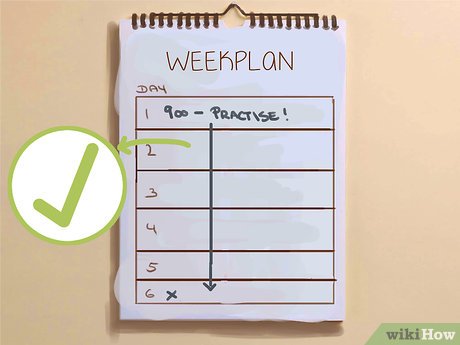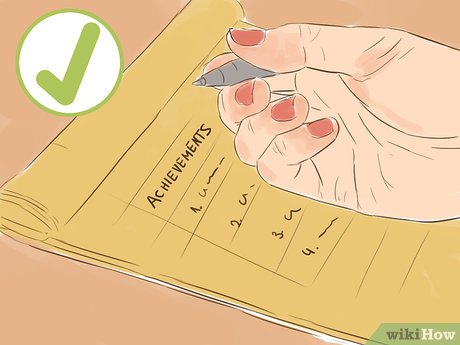How to Be Talented in Multiple Areas
Method 1 of 3:
Developing Multiple Talents with Practice
-
 Practice. Whatever it is you're trying to be talented at, you know you have to practice. This is especially true if you hope to be talented in multiple areas. Fortunately, you may not need to practice quite as much as you think, and can likely make the time to practice multiple skills every day. In order to get the most out of the time you put in, you have to focus on what you're hoping to learn.
Practice. Whatever it is you're trying to be talented at, you know you have to practice. This is especially true if you hope to be talented in multiple areas. Fortunately, you may not need to practice quite as much as you think, and can likely make the time to practice multiple skills every day. In order to get the most out of the time you put in, you have to focus on what you're hoping to learn.- Practice two different skills 40-45 minutes each, every day for a month.
- Don't worry if you miss a day of practicing one of your talents once in a while. If you practice each skill almost every day for a month, you'll have put in about 20 hours of focused practice on improving each of the talents you hope to develop![1]
-
 Deconstruct the talents you hope to acquire. In order to practice deliberately and efficiently, you need to make sure you are absolutely focused during practice. One way to help maximize the efficiency of your practice time is to deconstruct the talents you hope to improve upon into specific skills.
Deconstruct the talents you hope to acquire. In order to practice deliberately and efficiently, you need to make sure you are absolutely focused during practice. One way to help maximize the efficiency of your practice time is to deconstruct the talents you hope to improve upon into specific skills.- Ask yourself; What, specifically, do you need to be good at in order to be more talented at whatever ability you're developing?
- Choose specific objectives to achieve each time you sit down to practice something. Repeat a small task or process many, many times until you've mastered it.[2] For instance, if you're trying to improve your ability to play a sport, choose an extremely basic aspect of playing that sport and spend 45 minutes straight on just that specific aspect.
- For example, if you're hoping to become a better soccer player, dribble a soccer ball back and forth on the field with just one foot.
- If you're hoping to improve your talent as a basketball player, shoot only lay-ups.
- Deconstructing your effort to improve one talent will help you improve other talents as well. Following the sports example, doing anything physically active will get you in better shape and improve your coordination, both of which will increase your physical abilities generally.
-
 Practice until you can self-correct. Practice enough so that you are able to both notice and correct errors in your execution of a particular ability. (Once you've completed a disciplined practice routine, during which you practice almost daily for a month, you will likely reach this point.)
Practice until you can self-correct. Practice enough so that you are able to both notice and correct errors in your execution of a particular ability. (Once you've completed a disciplined practice routine, during which you practice almost daily for a month, you will likely reach this point.)- Moving forward, your practice will become more efficient. This is because you have gained a solid base of knowledge from which your talent will more naturally progress.
- For instance, if you're hoping to improve your ability to play an instrument, practice playing the same single notes or chord so frequently than you automatically know exactly what you did wrong when the sound is even a little bit off.
-
 Be consistent and persistent. Dabbling and practicing are different things. Jogging or painting twice a week are fun and healthy things to do, but in order to acquire talent, you need to be more disciplined in your pursuit of improvement. Something that may help you be persistent is choosing two very different talents to practice and improve upon during the same time period.
Be consistent and persistent. Dabbling and practicing are different things. Jogging or painting twice a week are fun and healthy things to do, but in order to acquire talent, you need to be more disciplined in your pursuit of improvement. Something that may help you be persistent is choosing two very different talents to practice and improve upon during the same time period.- Get in the groove of practicing at the same time of day each day.
- Try practicing skills related to two talents you're hoping to improve upon back-to-back. Get in the habit of practicing one talent then immediately practicing the other.
- For example, right when you get home from a daily run, sit down to paint. Grouping your practice sessions together will encourage you to do both consistently.
- Work on two widely different talents to increase the variety of your daily activities. Following the example used in this step, doing something active like running pairs well with something creative and contemplative, like painting.
-
 Remove distractions during practice. Do not rely entirely on willpower to focus adequately during practice time. Here are a few tips to ensure your practice time is free of interruption:
Remove distractions during practice. Do not rely entirely on willpower to focus adequately during practice time. Here are a few tips to ensure your practice time is free of interruption:- Set aside a block of time devoted exclusively to practice and commit to practicing for that full length of time. Set a timer if you'd like.
- Turn your phone on silent.
- Make sure there are no screens running in your vicinity (unless you're using them to help you practice).
- If you have music playing, consider choosing something without lyrics.
Method 2 of 3:
Maintaining a Talent-Inducing Mindset
-
 Defy negative thoughts. In order to maintain talent in multiple areas, train yourself to prevent negative thoughts that can diminish your ability to work towards achieving the multiple goals you set for yourself. There are several ways to rid your mind of negative thinking:[3]
Defy negative thoughts. In order to maintain talent in multiple areas, train yourself to prevent negative thoughts that can diminish your ability to work towards achieving the multiple goals you set for yourself. There are several ways to rid your mind of negative thinking:[3]- Overcome fear. Audacious, yes. But reflect on what's holding you back. The most common barriers to acquiring talent are based on your emotions.[4] Recognize this and prevent emotional perspectives, such as fear, from preventing you from pursuing whatever talent you wish to acquire.
- Filter out the negative. We tend to filter out the positive and be overly concerned with the negative, especially in terms of our perspective on our own abilities. Don't fall for this mental trap. Contemplate your room for improvement only so far as it motivates you to continue improving.
- Recognize the middle ground. Abandon the concept of perfection. Don't think that you must be perfect at something to consider yourself talented.
-
 Strengthen your position with positive thinking. Optimism isn't going to make you good at anything on its own, but it will help. Recognize that it is objectively within your control to decide how to think about something, especially goals you set for yourself and your ability to accomplish them.
Strengthen your position with positive thinking. Optimism isn't going to make you good at anything on its own, but it will help. Recognize that it is objectively within your control to decide how to think about something, especially goals you set for yourself and your ability to accomplish them.- Respond to negative thoughts that arise by re-framing them in equally true, but more positive perspectives. For instance:[5]
- Instead of thinking, 'I've never done this before, and it seems hard,' think, 'Here's an opportunity to learn, and there are a few different ways to approach this.'
- Instead of thinking, 'I'm too lazy' or 'There's no way I can do that,' tell yourself, 'I haven't put enough time into this, but I can at least try it and see how it goes.'
- Finally, don't get discouraged by thoughts about how slowly your talents are improving. Decide to tell yourself that it's worth one more try.
- Respond to negative thoughts that arise by re-framing them in equally true, but more positive perspectives. For instance:[5]
-
 Practice the thinking part too. Even convincing yourself to favor positive thinking takes practice. It will pay off though. Become less critical of the world around you, and of yourself, simply by repeating positive sentiments to yourself and pushing away negative thoughts.
Practice the thinking part too. Even convincing yourself to favor positive thinking takes practice. It will pay off though. Become less critical of the world around you, and of yourself, simply by repeating positive sentiments to yourself and pushing away negative thoughts.- Maintaining a positive mindset will not only improve your mood, but will help motivate you to stick with the hard work required to acquire new talents.[6]
Method 3 of 3:
Broadening Your Ability to Gain Talent Generally
-
 Monitor your progress. Know that focused practice will not always be fun. Realizing the development of your talents, however, will be. Take note of and appreciate your achievements – such as a new personal record mile time or a particularly compelling painting.
Monitor your progress. Know that focused practice will not always be fun. Realizing the development of your talents, however, will be. Take note of and appreciate your achievements – such as a new personal record mile time or a particularly compelling painting.- If there are tangible indications of your progress (perhaps especially paintings), place them in locations you will frequently see them in order to motivate yourself to continue practicing and improving upon your talents!
-
 Rest. Keep your mind and body ready to practice with focus and energy. More to the point, rest strategically. If the talent you're trying to improve requires intense physical activity or mental focus, you're going to have to keep your mind and body conditioned enough to practice effectively.[7]
Rest. Keep your mind and body ready to practice with focus and energy. More to the point, rest strategically. If the talent you're trying to improve requires intense physical activity or mental focus, you're going to have to keep your mind and body conditioned enough to practice effectively.[7]- This may actually require that you do take off one day a week. This is important to do if it improves your ability to practice effectively for the rest of the week.
-
 Accept that innate skill is less significant than practice and perseverance. Even the abilities some people seem to be born with come more from training than from inborn talent.[8] This is true for athletes, musicians, and mathematicians!
Accept that innate skill is less significant than practice and perseverance. Even the abilities some people seem to be born with come more from training than from inborn talent.[8] This is true for athletes, musicians, and mathematicians!- Know you'll need some grit. Psychologists have come to use the term 'grit' when referring to an attribute held by successful people. Grit indicates both perseverance and passion in pursuing long-term goals.[9]
- Overcoming adversity in pursuit of developing your skills also positively contributes to improve your talents more generally. When facing challenges that others might not have to deal with, tell yourself that by overcoming them, you'll have a step up on everyone else.
-
 Improve upon talents that interest you. Even scientists aren't sure about how to increase talent. The question of how we become good at things is still largely unanswered. We do know that people who are exposed to things that they become drawn to naturally and who then become immersed in those things end up being good at them. With training and practice, people who are already into something become especially good at it. Accept the significance of these findings and act accordingly:[10]
Improve upon talents that interest you. Even scientists aren't sure about how to increase talent. The question of how we become good at things is still largely unanswered. We do know that people who are exposed to things that they become drawn to naturally and who then become immersed in those things end up being good at them. With training and practice, people who are already into something become especially good at it. Accept the significance of these findings and act accordingly:[10]- Observe and play without inhibition. Inspiration and curiosity will inevitably hit you and you'll end up pursuing talents you'll be interested in enough to stick with.
- Ignore the technical aspects of the talent you're hoping to acquire. You can bring in the technical aspects of perfecting your abilities once you're committed.
- Don't try to judge where your interests are coming from.
- Avoiding these tendencies will allow your more creative and emotional aspirations to get you hooked on something.
-
 Read. Reading is a great place to start learning about how you can become more talented in multiple ways. One of the main benefits here is perking your curiosity and motivating yourself to pursue new ways to expand your talents, or to pursue new talents altogether.
Read. Reading is a great place to start learning about how you can become more talented in multiple ways. One of the main benefits here is perking your curiosity and motivating yourself to pursue new ways to expand your talents, or to pursue new talents altogether.- Becoming interested in something you've read is seen as an indication that you may take especially well to the material.[11] If you become interested in something new, throw yourself at it.
- There are literal advantages to reading too: you learn about language and writing, about whatever era of history is relevant to the book, and, of course, about the content contained in the book. You're immediately more knowledgeable about all sorts of stuff, just by dragging your eyes back and forth across a page and interpreting a bunch of printed words!
- Of course, nothing compares to hands-on experience. Whatever you read about that appeals to you, practice doing it yourself and develop a new talent!
Share by
David Pac
Update 24 March 2020
You should read it
- ★ How to use Driver Talent for free driver updates
- ★ Not a salary, this is just 8 reasons why good employees quit
- ★ How to Practice Programming
- ★ From Elon Musk to Satya Nadella: This is a list of the top 29 CEOs of the technology world in 2018
- ★ Recruiting 'Z generation': 7 things managers need to know












